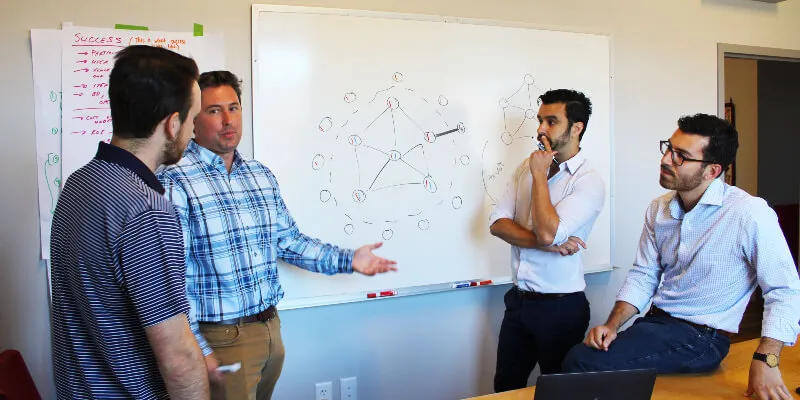Driven by his passion for environmental and social sustainability and a deep interest in implementing organizational transformative strategies and disruptive business models, Sustainable Innovation MBA ’19 graduate student Esteban Echeverria-Fernandez leapt at the opportunity to evaluate one of the hottest technologies around, blockchain, for his practicum project.
“The practicum project, hosted by Resonance, was an excellent opportunity to apply what we have learned in class in a real-world setting,” said Esteban, born and raised in San José, Costa Rica and who, before coming to UVM, was also part of the team that developed and operated the first hydrogen service station for fuel cell vehicles in Central America. “I chose this project because it offered me a chance to work with my peers, research a new technology, and create something from the bottom up; it was a product of all of us in equal parts.”
The final three months of UVM’s Grossman School of Business’ award-winning Sustainable Innovation MBA (SI-MBA) program comprises a full-time capstone experiential project -- a hands-on practicum engagement that immerses students directly into the world of sustainable business and innovation, to tackle some of the world’s most serious sustainability challenges.
As Vermont grows its reputation as a pioneer for sustainable businesses and a center for innovation, SI-MBA’s practicums have focused on a wide range of issues hosted by partners as diverse as Ben & Jerry’s, Ashoka, Burton, Facebook, Seventh Generation, REI, Interface, FIS Group, Ingersoll-Rand, and more. Students work in teams as consultants on a project designed by the host organization, with an agreed upon deliverable due at the end of the engagement.
A new practicum collaboration with Resonance gave Esteban, and his classmates Henry Vogt and Matt Iacobucci, the opportunity to evaluate blockchain, and its potential uses for Resonance’s clients. Resonance is a global development firm headquartered in Burlington that delivers market-based solutions to solve the world’s toughest challenges. The company provides consulting, advisory, and project support services that enable businesses, NGOs, and foundations to achieve their goals while reaching millions born into poverty.
Resonance is particularly interested in exploring ways to use blockchain effectively when it provides the best solution to a complex issue in a frontier or emerging market. As awareness of blockchain has grown, the firm’s clients are increasingly asking whether it is appropriate for their needs. The purpose of this practicum was to build upon Resonance’s initial work of developing a proprietary analytical tool for assisting clients to make better decisions about when and how to use blockchain in areas relevant to their work. In particular, the goal was to develop a framework applicable to corporate sustainability, supply chains, global development, environmental conservation, climate change, and agriculture in developing market contexts.
"I was drawn to this project because it was a great opportunity to work with a firm that is doing meaningful and inspiring work, while researching a technology that has potential for major innovation and disruption,” said Henry Vogt, a member of the SI-MBA team.
He continued, “As the project progressed, it became apparent how blockchain can be a powerful tool to solve problems in complex markets while creating opportunities for shared value across many sectors, which inspired us to create a framework that had real value & utility. This has been a great opportunity to use our classroom knowledge while working with an excellent Resonance team who are collaborative, innovative, insightful, hard-working, and care deeply about their work.”
After working through the summer, the Sustainable Innovation MBA team presented their results to Resonance and a panel of executives, chief sustainability officers, entrepreneurs, program faculty, and fellow students. A successful practicum presentation is required for graduation.
Steve Schmida, Resonance’s Chief Innovation Officer said, “Vermont has become a hub for global sustainability solutions, and we are proud to partner with UVM’s Sustainable Innovation MBA to develop tools that help our clients better understand when blockchain can be an effective solution to transparent, sustainable supply chains.”
For Matt Iacobucci, the third member of the team, the creation of shared value was key. “The use of the framework we developed serves Resonance in offering a new capability for serving its clients' needs, serves Resonance’s corporate clients in de-risking their supply chains, and serves blockchain developers in paving the way for partnerships with Resonance’s clients. This is exactly what we mean in the SI-MBA program when we talk about “creating shared value”: identifying solutions that get all necessary stakeholders involved, and then putting forward solutions that result in positive and equitable outcomes for all.”
And as for Esteban, what did he take away from the experience? “This experience met all my expectations, as the team from Resonance gave us so much support and guidance for the duration of our project. Blockchain brings trust to multi-stakeholder environments and these technologies are a total gamechanger when it comes to the design of sustainable solutions in frontier markets where Resonance operates,” he explained. “However, proper understanding of the technology and context are needed in order to correctly implement it. The framework we developed will help Resonance and their clients to do exactly this.”
Changing the world is our business, and these practicum projects and their impact will be just the beginning of new, innovative business solutions for the common good.
